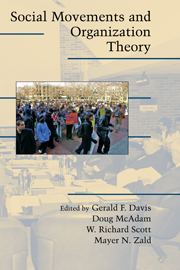Book contents
- Frontmatter
- Contents
- Contributors
- Preface
- I Creating a Common Framework
- II Political and Mobilization Context
- III Social Movement Organizations: Form and Structure
- IV Movements Penetrating Organizations
- 9 THE IMPACT OF SOCIAL MOVEMENTS ON ORGANIZATIONS: ENVIRONMENT AND RESPONSES
- 10 ORGANIZATIONAL CHANGE AS AN ORCHESTRATED SOCIAL MOVEMENT: RECRUITMENT TO A CORPORATE QUALITY INITIATIVE
- 11 SUBVERTING OUR STORIES OF SUBVERSION
- V Conclusion
- References
- Author Index
- Subject Index
10 - ORGANIZATIONAL CHANGE AS AN ORCHESTRATED SOCIAL MOVEMENT: RECRUITMENT TO A CORPORATE QUALITY INITIATIVE
Published online by Cambridge University Press: 05 September 2012
- Frontmatter
- Contents
- Contributors
- Preface
- I Creating a Common Framework
- II Political and Mobilization Context
- III Social Movement Organizations: Form and Structure
- IV Movements Penetrating Organizations
- 9 THE IMPACT OF SOCIAL MOVEMENTS ON ORGANIZATIONS: ENVIRONMENT AND RESPONSES
- 10 ORGANIZATIONAL CHANGE AS AN ORCHESTRATED SOCIAL MOVEMENT: RECRUITMENT TO A CORPORATE QUALITY INITIATIVE
- 11 SUBVERTING OUR STORIES OF SUBVERSION
- V Conclusion
- References
- Author Index
- Subject Index
Summary
Understandings of organizational change, like organizations themselves, are informed by assumptions of rationality, authority, and functional integration (Meyer and Rowan 1977). The focus is on formal adoption of new procedures and their subsequent implementation. New rules are promulgated, organizational units or formal roles are created, and incentive systems are modified. The process may be messy and contested in practice – organization members may resist and strategies backfire – but these are problems to be sorted out through redoubled authoritative intervention.
Many efforts at organizational change are better understood as social movements. In these contexts, a logic of mobilization replaces a logic of authority. Activists seek to recruit adherents and broadcast success. Normative appeals to individual or collective benefits substitute for material resources. The guiding principle is not that leaders will enforce change, but that unmanaged positive feedback can permit new behaviors to diffuse and become self-sustaining.
Zald and Berger (1978) made this argument forcefully, pointing out that formal organizations are simply another type of polity within which social movements can arise. They suggest parallels between the overthrow of organizational leaders and coups d'état, whistle blowing and bureaucratic insurgency, and prison riots and mass movements. Scully and Segal (2002) and Scully and Creed (this volume) extended and subverted this line of analysis to discuss the personal experience and strategies of “internal activists,” detailing how efforts to challenge structured inequality are sustained within organizations.
- Type
- Chapter
- Information
- Social Movements and Organization Theory , pp. 280 - 309Publisher: Cambridge University PressPrint publication year: 2005
- 19
- Cited by



